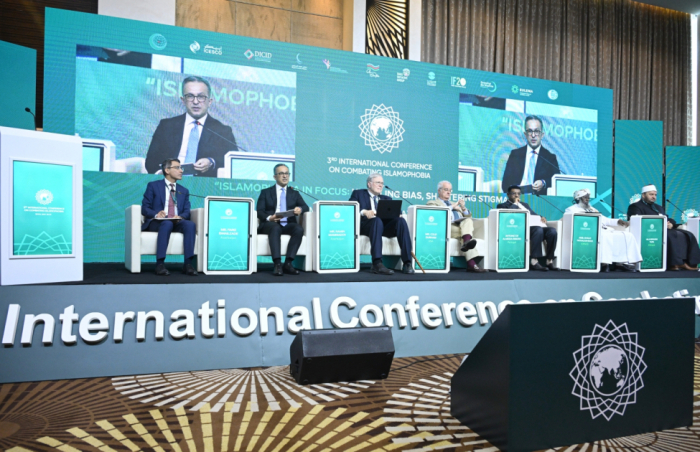Following the opening ceremony, the two-day international conference titled “Islamophobia in Focus: Unveiling Bias, Shattering Stigmas” continues in Baku with panel and plenary sessions.
The plenary session, moderated by Fariz Ismailzade, Vice-Rector of ADA University and member of Parliament, focused on the topic “Global Trends in Islamophobia: Challenges and Responses.”
Ramin Mammadov, Chairman of the State Committee on Religious Associations of the Republic of Azerbaijan, stated that Islamophobia extends beyond religious intolerance, representing a complex socio-psychological issue that fuels prejudice and conflict within societies. “It takes on a more dangerous form when exploited for political and ideological purposes,” he emphasized.
“Combating Islamophobia requires addressing not only its manifestations but also its roots. To understand, unveil, and eliminate these sources, comprehensive and strategic approaches are essential. In this regard, it is important to learn from countries experienced in multiculturalism. Azerbaijan is exemplary in this field,” Ramin Mammadov added.
Professor Cole Durham, President of G20 Interfaith Forum, expressed gratitude to Azerbaijan for hosting the conference. “Islamophobia is a complex issue with deep historical roots. It also contributes to a clash of civilizations,” he noted.
He underscored that the IF20 forum highlights racism as a serious, widespread problem demanding sustained attention across all aspects of the organization’s work. “Islamophobia is systematically linked to other issues, and addressing these collectively can be the most effective way to make real progress,” Cole Durham added.
Ambassador António de Almeida-Ribeiro, Acting Secretary General of the International Dialogue Centre – KAICIID, highlighted the importance of the Baku conference as a platform to address the growing global threat of Islamophobia and reaffirm a united stance against the new challenges posed by the digital age.
“While digital platforms hold great potential for education and advocacy, they have unfortunately become fertile ground for hate speech. Islamophobic expressions on social media have increased by 21%,” he noted. Almeida-Ribeiro stressed that bringing religious leaders together is a powerful way to promote mutual understanding among faiths and strengthen efforts against discrimination.
Ambassador Khalid Fathalrahman, Head of ICESCO’s Center of Civilizational Dialogue, praised Azerbaijan’s support for ICESCO and highlighted the conference’s role in raising awareness and promoting tolerance internationally.
“Concerted efforts are needed to combat Islamophobia, including collaborative action against conservative forces,” Khalid Fathalrahman said. “ICESCO has a profound responsibility in this area, driving awareness initiatives that help people in the West broaden their understanding of Islam. Such inclusive dialogue is essential—no one should be left behind.”
Ibrahim Najm, Secretary General of the Fatwa Authorities Worldwide, addressed misconceptions about “fatwa” in the Western world, where it is often misunderstood as a death sentence. “Public education on fatwas is necessary. We live in an age of abundant information but little wisdom. Fatwas, which are simply advice and non-binding, play an important role in the fight against Islamophobia,” he said.
Najm added that empowering young scholars to educate the global community, organizing online courses, and amplifying accurate voices are crucial to combating Islamophobia.
Other speakers also underscored the importance of joint efforts to tackle Islamophobia during the plenary session, which continued with active discussions.
More about: #Baku #internationalconference
















































